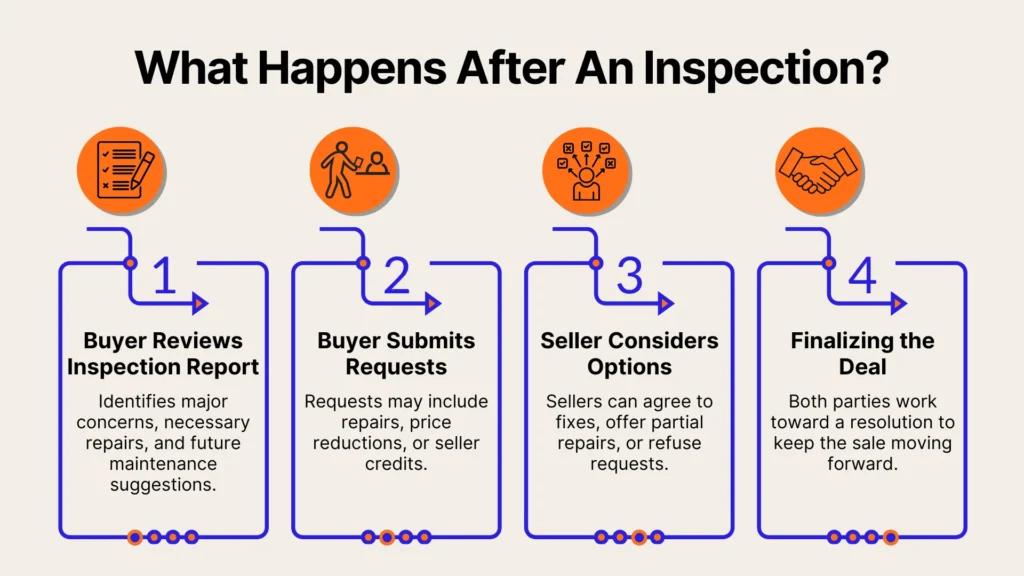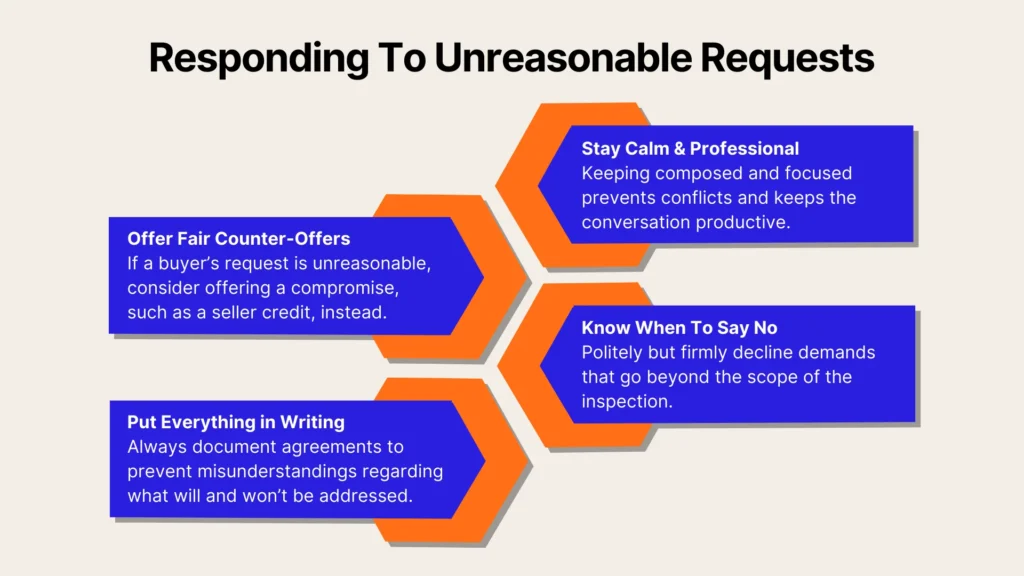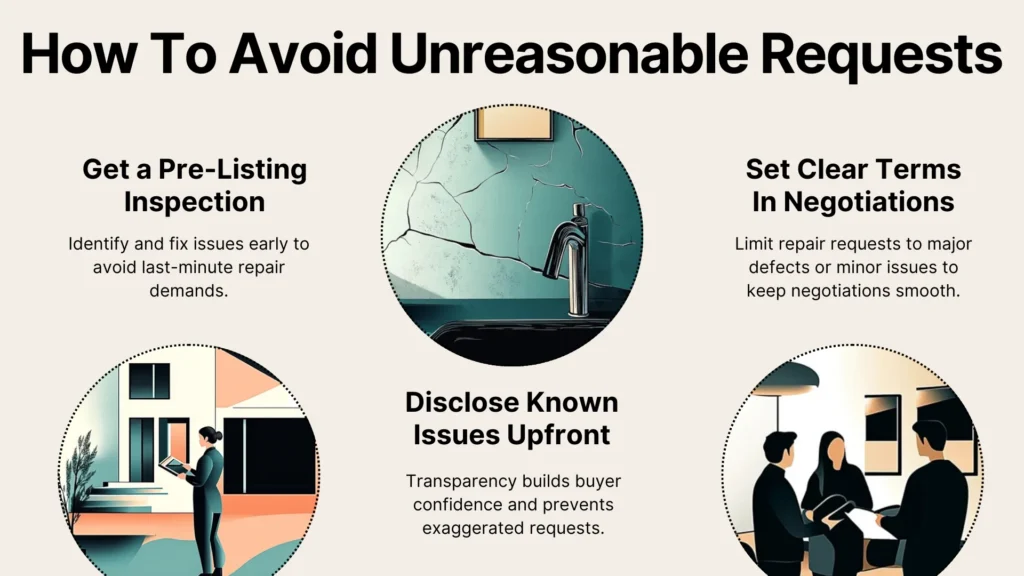Buying a home is a major financial decision, and it’s normal for buyers to request repairs after a home inspection. But sometimes, those requests can get a little unreasonable. From demanding brand-new roofs for minor wear and tear to asking for cosmetic upgrades that have nothing to do with safety, some buyers take the post-inspection phase to a new level.
While negotiations are expected, there’s a fine line between reasonable concerns and nitpicky demands. So, what are some of the most common excessive requests buyers have made after an inspection? And how should sellers respond to keep the deal on track? Keep reading as we dive into unreasonable post-inspection requests and share expert tips on handling them like a pro.
What Is a Home Inspection?
When selling your home on your own, a home inspection can be a valuable tool to build buyer trust and ensure a smooth transaction. Typically conducted after accepting an offer but before closing, it helps uncover potential issues and provides transparency, giving buyers confidence in their purchase.
A licensed inspector will assess critical areas such as the roof, plumbing, electrical systems, HVAC, and foundation, then provide a detailed report outlining any concerns. While inspections help buyers make informed decisions and avoid unexpected problems, they can also lead to demands that may not always be reasonable.
Knowing what to expect and how to handle requests can make negotiations smoother for both buyers and sellers. Read on to learn how to address inspection-related demands with confidence.
What Happens After the Home Inspection?

Once the home inspection is complete, the next steps can determine how smoothly (or not) the sale moves forward. The inspection report provides a detailed look at the home's condition, highlighting any potential concerns, from major structural issues to minor cosmetic flaws.
At this stage, buyers typically review the report and decide how they want to proceed. They may request repairs, negotiate a price adjustment, or, in rare cases, walk away from the deal altogether. You, on the other hand, must decide which requests are reasonable and which ones are simply too much.
Negotiating after an inspection is incredibly common, with approximately 83% of recent home buyers asking for concessions during this stage whether in the form of repair requests or financial credits.
While it’s reasonable to address significant problems like a faulty HVAC system or a leaking roof, some buyers push the limits with requests for brand-new appliances, fresh paint, or even landscaping updates. Knowing what’s fair and how to respond can help both you and the buyer navigate this phase, keeping the deal on track without unnecessary stress.
Buyer Receives the Inspection Report
Once the inspection is complete, the buyer receives a written report detailing the inspector’s findings. The report includes major safety concerns, necessary repairs, and general maintenance suggestions. Some inspectors may also provide recommendations for future maintenance, helping buyers plan for long-term homeownership responsibilities.
You’ll want to review your inspection report carefully, separating the must-fix issues from the minor or cosmetic ones. Understanding this difference can help you make fair and reasonable requests while keeping the negotiation process smooth.
Buyers Submit Repair Requests or Renegotiate the Deal
After reviewing the report, buyers may submit a list of requested repairs. They might also ask for a price reduction or seller credits instead of repairs.
Seller’s Options: Accept, Negotiate, or Decline the Requests
You can respond to a buyer request in several ways:
- Agree to complete the requested repairs.
- Offer partial repairs or a credit to cover the cost.
- Decline the requests altogether.
Common Types of Unreasonable Buyer Requests
It’s normal for buyers to ask for certain concessions, but not every request is practical or fair. Being aware of common unreasonable demands can help sellers protect their interests while keeping the deal on track.
Demanding Cosmetic Repairs
Cosmetic issues include items that do not impact the home’s function or safety. Examples include repainting walls, replacing outdated light fixtures, or refinishing floors. While buyers might prefer a freshly updated home, You are not obligated to make aesthetic improvements.
You should push back against these requests by clarifying that cosmetic updates are the buyer’s responsibility. If the home’s condition was clear before the offer, expecting upgrades after an inspection is unreasonable.
Requesting Code Upgrades on an Older Home
Building codes change over time. What was considered up to standard 20 or 30 years ago may not meet today's regulations. However, You, the seller, are not required to bring an older home up to modern code unless there is a safety issue.
For example, an inspector may note that an older home lacks ground fault circuit interrupter (GFCI) outlets in bathrooms. While modern homes require them, older homes are not obligated to be retrofitted unless there is a clear hazard.
Nitpicking Minor Issues
Some buyers focus on insignificant concerns, such as small cracks in the driveway, slightly loose cabinet hinges, or a single missing roof shingle. While no home is perfect, minor imperfections do not justify major negotiations.
Sellers can respond by reminding buyers that an inspection is not meant to create a punch list of every tiny defect. If the issue does not affect the home’s function or safety, it is not a reasonable repair request.
Asking for Items Outside the Scope of the Inspection
Some buyers attempt to leverage the inspection to request upgrades or improvements unrelated to the report. Examples include:
- Asking for new kitchen appliances when the existing ones are fully functional.
- Requesting professional landscaping work.
- Demanding upgraded countertops or flooring.
These requests go beyond the purpose of an inspection and should be declined.
Requesting Entire System Replacements Without Cause
A home may have an older HVAC system, water heater, or roof, but if it functions properly, there is no reason to demand a full replacement. Some buyers, however, use age alone as justification for major upgrades.
Sellers can counter these demands by providing maintenance records or professional evaluations showing that the system is still in good working condition.
Why Buyers Make Unreasonable Requests
Buyers don’t always make unreasonable requests out of bad intentions; often, their concerns come from uncertainty or a lack of experience. Fear of making a costly mistake can lead them to ask for more than what’s fair, even if they don’t realize it.
Fear and Inexperience
First-time buyers often overreact to normal inspection findings. They may not understand that no home is flawless and that minor wear and tear is expected. Their lack of experience can lead to unrealistic repair requests.
Attempting to Negotiate a Lower Price
Some buyers see the inspection report as a way to reduce the purchase price. They may exaggerate small issues to pressure the seller into lowering the price or offering concessions.
Advice from Overzealous Friends or Family
Well-meaning friends and relatives often weigh in on the inspection report, encouraging buyers to push for more than is reasonable. While their advice may come from a good place, it can lead to unrealistic expectations.
How to Identify Unreasonable Requests
Not every buyer request is unreasonable, but knowing how to spot the ones that are can save you time and frustration. A key part of this is understanding the difference between essential repairs and cosmetic fixes that buyers simply prefer.
Know the Difference Between Necessary Repairs and “Nice-to-Have” Fixes
Sellers should focus on repairs related to safety, structural integrity, and functionality. Issues like a leaking roof, faulty wiring, or plumbing leaks deserve attention. A request for new countertops or fresh paint falls into the “nice-to-have” category and can be declined.
Use the Inspection Report as a Guide
If the inspector highlights a legitimate safety concern, it may be worth addressing. However, if the request goes beyond the report’s findings, sellers should question its validity.
Consider Market Conditions
In a seller’s market, where demand is high, sellers have more leverage to reject unreasonable requests. In a buyer’s market, however, flexibility may be necessary to keep the deal moving forward.
How to Respond to Unreasonable Requests

Handling unreasonable buyer requests with grace can keep negotiations moving smoothly and stress levels in check. The best approach starts with staying calm and professional, setting the stage for a constructive conversation. Here’s a straightforward guide on how to do so:
- Stay calm and professional: Negotiations can be stressful, but responding with frustration can make the situation worse. Approach discussions with a calm and business-like attitude.
- Offer reasonable counter-offers: If a request seems excessive, consider offering a fair alternative, such as a small credit instead of completing unnecessary repairs.
- Know when to say no: You do not have to agree to every request. If a demand is unreasonable, politely but firmly decline it.
- Put everything in writing: All agreements should be documented to avoid misunderstandings. A written response outlining what the seller will and will not do helps prevent disputes later.
Proactively Protecting Yourself from Unreasonable Requests

One of the best ways to handle unreasonable buyer requests is to prevent them from arising in the first place. Taking proactive steps can help set clear expectations and reduce the likelihood of unexpected demands during negotiations.
Get a Pre-Listing Home Inspection
A pre-listing inspection helps you identify and address potential issues before listing, reducing the risk of unexpected repair demands. Homes with pre-listing inspections often sell faster and with fewer price reductions since buyers feel more confident making an offer.
Disclose Known Issues Upfront
Being upfront about known issues prevents buyers from using them to justify exaggerated post-inspection demands. The National Association of Realtors (NAR) reports that full disclosure improves buyer confidence and reduces the chances of deals falling through.
Set Clear Boundaries in the Sales Agreement
A well-written sales agreement can limit repair requests to major defects, preventing negotiations over minor or cosmetic issues. With 83% of buyers requesting concessions after an inspection, setting clear terms upfront can save time and keep your sale on track.
When to Walk Away

Deciding to walk away from a deal isn’t easy, but sometimes it’s the best choice for your long-term financial and emotional well-being. Understanding when a negotiation isn’t worth the stress or investment can help you make a confident and informed decision.
Sellers should realize that it’s time to walk away when they know, deep down, the effort and additional cost is not worth it. Some buyers make excessive demands that indicate they are either not serious or will be difficult to work with. You should recognize that walking away is better than meeting unreasonable expectations.
Likewise, understanding your market position may give you signs that the deal isn’t good anymore. Knowing their home’s value and demand in the area gives sellers confidence. If the market is strong, there is no need for you to give in to excessive requests just to keep a deal alive.
Conclusion
Home inspections are a standard part of the selling process, but they should not be an excuse for buyers to make unreasonable demands. You should understand which requests are fair and which ones should be declined. By staying calm, negotiating wisely, and knowing when to stand firm, you can deal with these unreasonable requests with no issue.
Propbox helps you handle unreasonable post-inspection requests while avoiding costly realtor fees. With smart negotiation tools, automated responses, and organized documentation, you can push back on unrealistic demands and keep your sales on track. By streamlining the process and eliminating unnecessary back-and-forth, Propbox ensures you stay in control and close the deal on your terms. Sell smarter with Propbox today!
